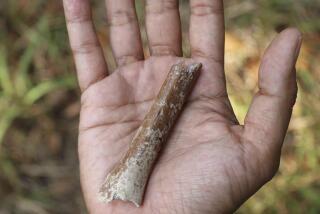Tooth Fossils Tell Tale of Ages
- Share via
LONDON — Neanderthals may conjure up images of an uncivilized, brutish species, but they were surprisingly young developers, researchers said Wednesday.
Although Neanderthals disappeared from Europe about 30,000 years ago, scientists at the French research institute CRNS in Paris have uncovered new details about them by studying fossils of teeth.
The findings, reported in the science journal Nature, suggested that Neanderthals reached adulthood by the age of 15, about three years before early modern humans; probably ate a high-calorie diet; and were a distinct species from modern humans.
Creatures with large brains tend to have a lengthier growth period and take longer to mature, but Fernando V. Ramirez Rozzi and his colleague Jose Maria Bermudez de Castro found that the opposite applied with Neanderthals.
“This difference in growth between Neanderthals and modern humans is, I think, very strong proof of two different species,” Ramirez Rozzi said.
Why they developed so quickly is a puzzle, but Ramirez Rozzi suspected that Neanderthals had a high mortality rate because of the hostile conditions in which they lived, and that they adapted to this by maturing quickly.
Ramirez Rozzi and Bermudez de Castro studied the series of ridges, called perikymata, on the fossils.
They compared tooth fossils from Neanderthals dating from 130,000 to 28,000 years ago, earlier samples that were 800,000 to 400,000 years old, and tooth fossils of Homo sapiens that were 20,000 to 8,000 years old.
“Neanderthals were characterized by having the shortest period of dental growth,” said Ramirez Rozzi.






